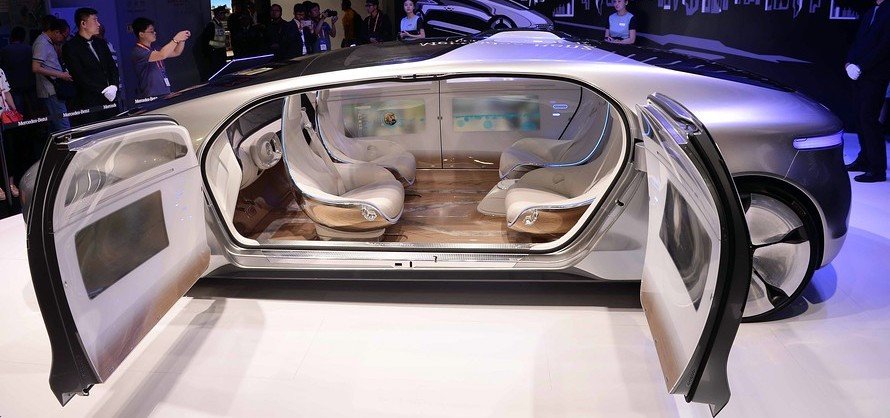People are going to sell sex in driverless cars, researchers say

The rise of driverless cars is expected to displace workers, slash cab fares and give people another place to have sex. Possibly for money.
That's according to a new study from the Annals of Tourism Research with the deceptively dry title: "Autonomous vehicles and the future of urban tourism."
Researchers who study hospitality and technology in the United Kingdom teamed up this year to explore how advances in automated transportation could reshape tourism around the world.
Co-authors Scott Cohen, a tourism professor at the University of Surrey, and Debbie Hopkins, a transport studies lecturer at the University of Oxford, found that autonomous vehicles have the potential to unleash far more than robot-guided Uber rides.
"It's only a natural conclusion that sex in autonomous vehicles will become a phenomenon," Cohen told The Washington Post, citing convenience and the lack of front-seat chaperones.
The academics pored over about 150 studies on the future of cars and tried to imagine the technology's impact on tourism in marquee cities: How could AVs change the way newcomers move and sightsee and revel?
Once driverless cars flood the roads — Silicon Valley analysts estimate that day is less than a decade away — futurists predict that traditional taxis will phase out.
Free of driver costs, companies could invest more in the customer experience. Interiors may become more spacious. Cabs could come with bedding or perhaps a massage chair, analysts forecast. Passengers might tap an iPad to hear Marvin Gaye.
Enter "hotels-by-the-hour" on wheels, Cohen said — a fleet of rolling love dens. Tourists could summon one on yet-to-be-invented apps.
"It is just a small leap to imagine Amsterdam's Red Light District 'on the move,' " Cohen and Hopkins wrote in their study, to be published in January. Sex, they noted, "plays a central role in many tourism experiences. "
Of course, prostitution — mobile or otherwise — is illegal everywhere in the United States but a handful of counties in Nevada. Motivated lawbreakers will probably find a way around that, the authors predict.
"While [driverless cars] will likely be monitored to deter passengers having sex or using drugs in them," they wrote, "such surveillance may be rapidly overcome, disabled or removed." Bad actors could hack into a vehicle's system or block cameras.
Authorities should prepare for such looming threats, Cohen said. Autonomous vehicles could provide cover for a range of illicit activities, including drug dealing or even terrorism in the form of remote-controlled bombs. (The report didn't recommend any particular safeguards.)
Driverless cars could also exacerbate inequality if businesses pay to influence the algorithms that guide them, the authors pointed out: Restaurants that can afford to appear on a tour vessel's "top destinations" menu would gain a swift advantage over smaller shops.
The technology will introduce a universe of opportunities, said Missy Cummings, a mechanical engineering professor at Duke University. An on-the-road brothel doesn't defy possibility, she said.
But entrepreneurs shouldn't count on cashing in any time soon.
Safety standards have yet to be set for autonomous vehicles, Cummings said, even as automakers such as Volvo have released models with sleeping pods.
One of Uber's test cars struck and killed a pedestrian in March. (Investigators later learned Uber employees had disabled the automatic-braking features so the vehicle wouldn't slow erratically during testing.)
"Whenever anyone proposes anything beyond riding in your car and sitting belted in — whether it's sex or getting a massage or getting your hair cut — all of those suffer from the same reality check," Cummings said. "You're still a body that can die in a moving vehicle. "
Additional services will require extra safety tests.
"There are dangers of collision, of getting thrown around," said Bryant Walker Smith, a law professor at the University of South Carolina who focuses on autonomous vehicles, "and if you're doing particularly intense activities, you're going to be at risk of unusual injuries."
This possibility doesn't halt related brainstorming at AV conferences, he added.
"Automated vehicles as a platform for the delivery of services is a common theme," Smith said. "Sex work is just one set of possible services. "
Then there's the matter of privacy.
Kate Devlin, author of "Turned On: Science, Sex and Robots," said tinted windows can't hide everything.
"Self-driving cars track a lot of data," she said in an email.
Couples who hail automated taxis should be aware the cars could collect more than a map of their travels. Unlike the typical hotel room, they'll have sensors, speakers and cameras.
The implications for sex workers are even more complicated.
"Would this be good in terms of sex workers' security in that it could provide location information for safety," Devlin wrote, "or could such data be used against sex workers where such work is criminalized?"
Related News
